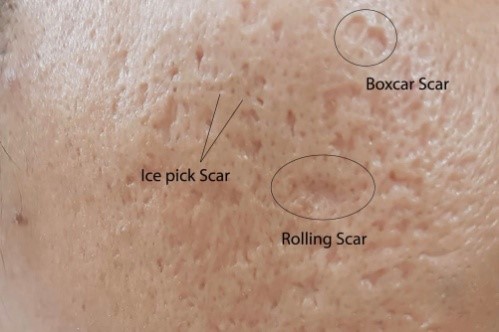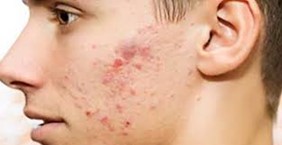
Acne; These are acne caused by the activity of the sebaceous glands, located on the face, back and body. It is mainly seen in two different periods: teenage acne and adult acne (after the age of 25). There are mild, moderate and severe types.
What causes acne?
Increased oil secretion during adolescence accumulates in the hair structure and sebaceous glands and forms black or white spots called comedones. Conditions such as applying oily creams, sweating, make-up, and not using appropriate cleansers clog the pores, and the bacteria accumulating in the clogged pores leads to acne.
The relationship between the sun and acne. are there?
Sun rays can alleviate acne. However, oil-free sunscreen products should be used and one should not stay under direct sun. Otherwise, stains may remain. Is it possible to have acne without treatment? Acne must be treated by a dermatologist because it recurs, creates psychological stress, and can leave permanent scars. The duration of treatment is determined according to the patient's condition.
How is acne treated?
Your treatment will be arranged according to the severity of acne. Every patient is different and each patient's treatment is different. A response is received on average within 2-4 months. Today, there are 4 main ways to treat acne.
*1. Cream Treatments: For mild and moderate acne, products containing antibiotics (erythromycin, clindamycin, tetracycline), benzoyl peroxide, retinoid, tretinoin, isotretinoin, adapalene can be used.
< strong>*2. Oral antibiotic treatment: Tetracycline, erythromycin or azithromycin group antibiotics can be used for 2-6 months if your dermatologist deems it appropriate.
*3. Isotretinoin treatment: It is a vitamin A derivative drug that is generally effective in severe acne or cases that do not respond to antibiotic treatment. Although it is a very effective treatment, it has various side effects. The most common of these is skin dryness, especially dry lips, but most of these side effects disappear after treatment. Liver tests and blood lipids are routinely checked before and during treatment. All side effects are caused by the medicine. It usually disappears when cut. Young people in their fertile period medicine in women A pregnancy test should be taken before use, during treatment and 1 month after treatment. It should be protected with at least two birth control methods during treatment.
*4. Other methods: In some patients, there are successful results in acne related to oral contraceptive drugs, laser, radiofrequency and phototherapy. It should not be forgotten that the most important point in treatment is to be in harmony with the physician and comply with the recommendations given.
Is the cause of acne a liver disorder?
There is no relationship between acne and liver disorder. We only give our patients systemic antibiotics or medication such as isotretinoin (Roaccutane, zoretanin, aknetrent); We request liver enzyme tests before starting.
Is there a genetic predisposition to acne?
There is a genetic predisposition and it is more common in individuals with severe acne problems in their family.
There is a connection between diet and acne. Is there a relationship?
Processed foods and dairy products, which quickly increase blood sugar, cause insulin and some hormones to rise rapidly and thus It has been shown to trigger acne. These foods; Foods such as chocolate, potatoes, white bread, sugar, fast food, fried foods, ready-made fruit juices, crackers, seeds, hazelnuts and walnuts. It is not recommended to consume excessive amounts of such foods.
Is there a connection between menstrual irregularity and acne?
If acne started after the age of 25 If there are any complaints such as menstrual irregularity, weight gain, excessive hair growth around the chin, abdomen and nipple, an evaluation should be made in terms of hormone disorder and polycystic ovary disease. Acne complaints may increase during menstrual periods, this is a natural process caused by hormones.
Is squeezing acne recommended?
Squeezing and poking acne is definitely not recommended. Inflammation in acne can spread, increasing the risk of scarring. However, comedones can be cleaned and abscesses can be drained under the supervision of a doctor.
*In our clinic, we offer topical creams for acne and acne scars, systemic treatment, aqua-peel skin care, chemical peeling, dermapen, PRP, endy-med RF (gold needle), fractional 1540 Er-glass laser treatments can be given.



